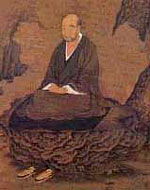Koso Wasan 31
Though we had the words of Bodhisattva Vasubandhu,
If Master T'an-luan had not clarified them,
How could we come to know the mind and practice
Of vast, majestic virtues, which are Other Power?
Other Power

Before T'an-luan, both Nagarjuna and Vasubandhu had realised the significance of Other Power from the reality of their own experience. This gave them insight into the way in which the bodhisattva path functions for the liberation of all. In his Commentary on [Vasubandhu's] Treatise on the Pure Land, T'an-luan expands upon this experience and shows that we can be its beneficiaries if only we can accept it.
Power of he Primal Vow: the great bodhisattva, having realized the dharma-body, always dwells in samadhi and thus manifests various bodies, various transcendent powers, and various ways of teaching the dharma. All of this arises from the power of the Primal Vow. It may be likened to an asura's1 harp, which, though no one strokes it, spontaneously gives forth music.2
The power of the Primal Vow reaches beings in manifold ways, bringing them to trust it almost unawares. It is only after shinjin has become settled that they can piece together the story of their lives and see with clarity how the power of Amida Buddha's dharma has effected its sacred mission to call them in the Name. Even then, the working of the Primal Vow is more subtle than we can imagine.
T'an-luan's analogy of the asura's harp is most apt. The power of the Primal Vow works entirely by itself and on its own terms - 'though no one strokes [the harp] it spontaneously gives forth music.' The music of 'valiant nembutsu' (isami-no-nembutsu) - unmotivated nembutsu of gratitude for the working of the Primal Vow - alone attesting to the fact that beings now walk in its light.
Six hundred years after T'an-luan, Shinran discovered for himself our actual inability to create faith ourselves - to trust it! But the transformation that comes from trust and the awakenning of shinjin is - to my mind, at any rate - obviously something integral to T'an-luan's own personal experience. He felt the Power of the Vow - he knew it. From this perspective he was able to understand and explain the related references within the writings of his own masters, Nagarjuna and Vasubandhu.
Hence, Tan-luan's great contribution to Pure Land teaching is his emphasis on the importance of Other Power.
Had T'an-luan not known the reality of Other Power for himself, I doubt that he would have seen the significance of the passing references in these writings or be able - so deftly - to draw them together in the serendipity that leaps at us from the concluding passages of his Commentary.
Inferring from these proofs, we see that Other Power is to be taken as the decisive cause. How could it be otherwise?
Further, the following illustration will point out the characteristics of self-power and of Other Power. Out of fear of falling into the three evil courses, people undertake the observance of the precepts. Because of their observance of the precepts, they are able to perform meditation. Because they perform meditation, they acquire transcendent powers. Because they have transcendent powers, they are able to wander freely throughout the four continents - such is termed 'self-power.'
Again, a person of inferior powers astride a donkey cannot rise up off the ground, but when following an outing of a cakravartin king, is able to ride in the air and wander freely throughout the four continents with no obstruction - such is termed 'Other Power.' How foolish are scholars of these latter times! Hear the teaching that you should ride upon Other Power and awaken shinjin. Do not confine yourself to your own powers.3
I often think of T'an-luan, as a man, a monk, a quiet, unassuming dharma follower. He was a man who had discovered, perforce, the reality of his own weakness. He found - as we shall see later in the wasan to follow - that Other Power is known in direct proportion to the extent of our own personal, individual awakening to the truth of our own helplessness.
Other Power is the only, absolute truth; self-power is ultimately a monstrous illusion and deceit. Other Power is as real as the earth which supports our every step. When it comes to our liberation and the spiritual life, there is no chance that we will fly a single centimetre without it.
Namo Amida Butsu
1: Asuras were originally evil spirits, which were constantly at war with the Hindu deities. On hearing the Buddha Dharma, however, they converted and became semi-divine super-human beings, and protectors of Buddhism.
2: CWS, p. 57.
3: CWS, p. 60.